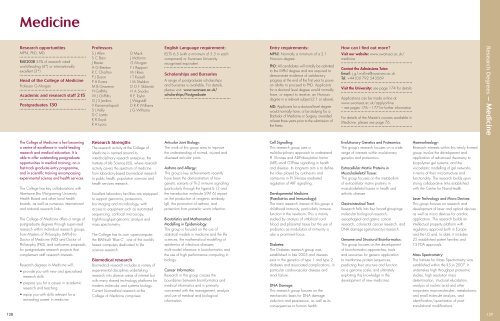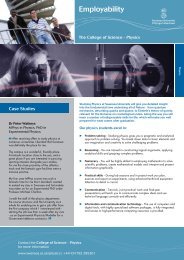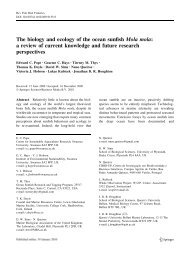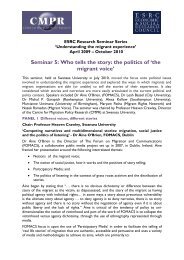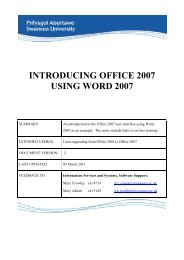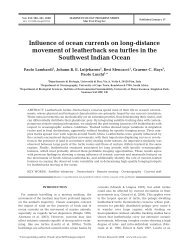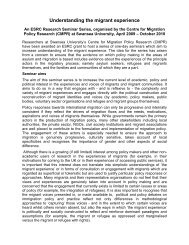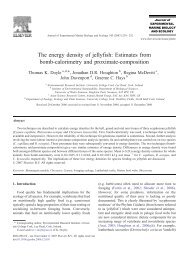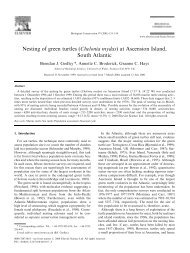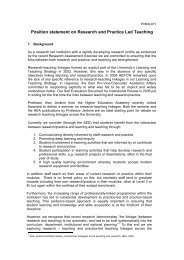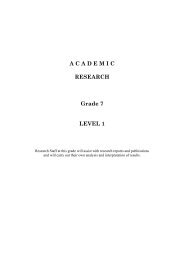Postgraduate Prospectus 2013 - Swansea University
Postgraduate Prospectus 2013 - Swansea University
Postgraduate Prospectus 2013 - Swansea University
Create successful ePaper yourself
Turn your PDF publications into a flip-book with our unique Google optimized e-Paper software.
Medicine<br />
Research opportunities<br />
MPhil, PhD, MD<br />
RAE2008 55% of research rated<br />
world-leading (4*) or internationally<br />
excellent (3*)<br />
Head of the College of Medicine<br />
Professor G Morgan<br />
Academic and research staff 215<br />
<strong>Postgraduate</strong>s 130<br />
Professors<br />
S J Allen<br />
S C Bain<br />
J Baxter<br />
A G Brenton<br />
R C Charlton<br />
P J Dyson<br />
P A Evans<br />
M B Gravenor<br />
H Griffiths<br />
W J Griffiths<br />
G J S Jenkins<br />
V Kanamarlapudi<br />
S L Kelly<br />
D C Lamb<br />
K R Lloyd<br />
R A Lyons<br />
D Mack<br />
J McKimm<br />
G Morgan<br />
F L Rapport<br />
M I Rees<br />
I T Russell<br />
I M Sheldon<br />
D O F Skibinski<br />
H A Snooks<br />
R E Taylor<br />
J Wagstaff<br />
D R R Williams<br />
J G Williams<br />
English Language requirement:<br />
IELTS 6.5 (with a minimum of 5.5 in each<br />
component) or <strong>Swansea</strong> <strong>University</strong><br />
recognised equivalent.<br />
Scholarships and Bursaries<br />
A range of postgraduate scholarships<br />
and bursaries is available. For details,<br />
please visit: www.swansea.ac.uk/<br />
scholarships/<strong>Postgraduate</strong><br />
Entry requirements:<br />
MPhil: Normally a minimum of a 2.1<br />
Honours degree.<br />
PhD: All candidates will initially be admitted<br />
to the MPhil degree and are required to<br />
demonstrate evidence of satisfactory<br />
progress at the end of the first year to prove<br />
an ability to proceed to PhD. Applicants<br />
for a doctoral level degree would normally<br />
have, or expect to receive, an Honours<br />
degree in a relevant subject (2:1 or above).<br />
MD: Applicants for a doctoral level degree<br />
would normally have, or be studying for, a<br />
Bachelor of Medicine or Surgery, awarded<br />
at least three years prior to the submission of<br />
the thesis.<br />
How can I find out more?<br />
Visit our website: www.swansea.ac.uk/<br />
medicine<br />
Contact the Admissions Tutor:<br />
Email: j.g.l.mullins@swansea.ac.uk<br />
Tel: +44 (0)1792 543569<br />
Visit the <strong>University</strong>: see page 174 for details<br />
Applications can be made online at:<br />
www.swansea.ac.uk/applyonline<br />
– see pages 176 – 177 for further information<br />
For details of the Master’s courses available in<br />
Medicine, please see page 76.<br />
Research Degrees – Medicine<br />
The College of Medicine is fast becoming<br />
a centre of excellence in world-leading<br />
research and medical education. It is<br />
able to offer outstanding postgraduate<br />
opportunities in medical training, on a<br />
fast-track graduate-entry programme,<br />
and in scientific training encompassing<br />
experimental science and health services.<br />
The College has key collaborations with<br />
Abertawe Bro Morgannwg <strong>University</strong><br />
Health Board and other local health<br />
boards, as well as numerous international<br />
and national research links.<br />
The College of Medicine offers a range of<br />
postgraduate degrees through supervised<br />
research within individual research groups,<br />
from Masters of Philosophy (MPhil) to<br />
Doctor of Medicine (MD) and Doctor of<br />
Philosophy (PhD), and welcomes proposals<br />
for postgraduate research projects that<br />
complement staff research interests.<br />
Research degrees in Medicine will:<br />
• provide you with new and specialised<br />
research skills<br />
• prepare you for a career in academic<br />
research and teaching<br />
• equip you with skills relevant for a<br />
rewarding career in medicine<br />
Research Strengths<br />
The research activity at the College of<br />
Medicine is centred around its<br />
interdisciplinary research enterprise, the<br />
Institute of Life Science (ILS), where research<br />
activity covers the spectrum of medicine<br />
from laboratory-based biomedical research<br />
to public health, population sciences and<br />
health services research.<br />
Excellent laboratory facilities are equipped<br />
to support genomics, proteomics,<br />
bio-imaging and microbiology, with<br />
access to equipment such as automated<br />
sequencing, confocal microscopy,<br />
high-throughput genomic analysis and<br />
mass spectrometry.<br />
The College has its own supercomputer,<br />
the IBM-built ‘Blue C’, one of the world’s<br />
fastest computers dedicated to life<br />
science research.<br />
Biomedical research<br />
Biomedical research includes a variety of<br />
experimental disciplines undertaking<br />
research into diverse areas of interest but<br />
with many shared technology platforms for<br />
modern molecular and systems biology.<br />
Current biomedical research at the<br />
College of Medicine comprises:<br />
Articular Joint Biology:<br />
The work of this group aims to improve<br />
the understanding of normal, injured and<br />
diseased articular joints.<br />
Asthma and Allergy:<br />
This group’s key achievements recently<br />
have been the demonstration of how<br />
genetic variants of Th-2 immune signalling<br />
(particularly through the ligand IL-13 and<br />
the transduction molecule STAT 6) impact<br />
on the production of reagenic antibody<br />
IgE, the promotion of asthma, and<br />
protection from parasitic worm infection.<br />
Biostatistics and Mathematical<br />
Modelling in Epidemiology:<br />
This group is focused on the use of<br />
statistical models in medicine and the life<br />
sciences, the mathematical modelling of<br />
epidemics of infectious diseases,<br />
multi-model inference in bioinformatics and<br />
the use of high performance computing in<br />
biology.<br />
Cancer Informatics:<br />
Research in this group crosses the<br />
boundaries between bioinformatics and<br />
medical informatics and is primarily<br />
concerned with the management, analysis<br />
and use of medical and biological<br />
information.<br />
Cell Signalling:<br />
This research group uses a<br />
multidisciplinary approach to understand<br />
PI 3-kinase and ADPribosylation factor<br />
(ARF) small GTPase signalling in health<br />
and disease. Its long-term aim is to define<br />
the roles played by cytohesins and<br />
centaurins in PI 3-kinase mediated<br />
regulation of ARF signalling.<br />
Developmental Medicine<br />
(Paediatrics and Immunology):<br />
The main research interest of this group is<br />
childhood immunity, particularly immune<br />
function in the newborn. This is mainly<br />
studied by analysis of umbilical cord<br />
blood and placental tissue but the use of<br />
probiotics as modulators of immunity is<br />
also a prominent focus.<br />
Diabetes:<br />
The Diabetes research group was<br />
established in late 2005 and interests<br />
exist in the genetics of type 1 and type 2<br />
diabetes and associated complications, in<br />
particular cardiovascular disease and<br />
renal failure.<br />
DNA Damage:<br />
This research group focuses on the<br />
mechanistic basis for DNA damage<br />
induction and persistence, as well as its<br />
consequences to human health.<br />
Evolutionary Genetics and Proteomics:<br />
This group’s research focuses on a wide<br />
range of interests within evolutionary<br />
genetics and proteomics.<br />
Extracellular Matrix Proteins in<br />
Musculoskeletal Tissue:<br />
This group focuses on the metabolism<br />
of extracellular matrix proteins in<br />
musculoskeletal tissues in health and<br />
arthritic disease.<br />
Gastrointestinal Tract:<br />
Research falls into four broad groupings:<br />
molecular biological research,<br />
oesophageal and gastric cancer<br />
research, colorectal cancer research, and<br />
DNA damage (genotoxicity) research.<br />
Genome and Structural Bioinformatics:<br />
This group focuses on the development<br />
of bioinformatics approaches, tools<br />
and resources for generic application<br />
to membrane protein sequences,<br />
predicting their structure and function<br />
on a genome scale, and ultimately<br />
exploiting this knowledge in the<br />
development of new medicines.<br />
Haemorheology:<br />
Research interests within this newly formed<br />
group involve the development and<br />
application of advanced rheometry to<br />
biopolymer gel systems; and the<br />
viscoelastic modelling of gel networks,<br />
in terms of their microstructure and<br />
functionality. The research builds upon<br />
strong collaborative links established<br />
with the Centre for NanoHealth.<br />
Laser Technology and Micro Devices:<br />
This group focuses on research and<br />
development of laser and optical devices<br />
as well as micro devices for cardiac<br />
application. This research builds an<br />
intellectual property platform with<br />
regulatory approval both in Europe<br />
and the US and, to date, it includes<br />
25 established patent families and<br />
15 FDA approvals.<br />
Mass Spectrometry:<br />
The Institute for Mass Spectrometry was<br />
established within the ILS in 2007. It<br />
undertakes high throughput proteomic<br />
studies, high resolution mass<br />
determination, structural elucidation,<br />
analysis of nucleic acid and other<br />
nonprotein macromolecules, metabolomic<br />
and small molecule analysis, and<br />
identification/quantitation of posttranslational<br />
modifications.<br />
128<br />
129


